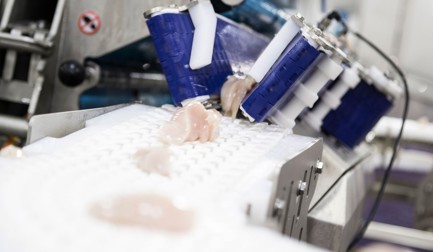How does this work in practice?
“A certain QSR brand asked some of our customers to produce specific fillet burgers, which are breaded whole muscle meat products. This has become a very popular burger now, that needs to be produced in high volumes in Europe. And now other QSR brands are following this fillet burger trend. So more and more processors around the world will be asked to produce to these specifications. If they are Marel customers, they’ll benefit from our expertise and experience in supplying such QSR solutions worldwide. We designed scalable and modular systems by combining various Marel systems, such as I-Cut 122 and SmartSplitter, to transform the chicken meat raw material into the required QSR product, in this case, breaded whole muscle burgers.
We can also precisely outline the financial benefits of installing such a Marel QSR processing line – whether it is a new line, an automated manual line or a replaced existing line. We have, therefore, really solved the complex puzzle of creating QSR end products.”
Why does Marel stand out in this area?
“We have succeeded in automating many processes that are relevant for QSR production, from pre-selecting raw material to fixed-weight portioning. Gradually, we need fewer and fewer operators at the line, which is good, given the poor availability of manual labor worldwide. For processors worldwide, labor reduction is an important argument to opt for automated production of QSR products.
In addition, the return on investment is mostly a very short time, as yields will increase; machines are more capable of maintaining a consistent quality level than people, who get tired at the end of the day. Also, the speed of handling products will go up. Applying Marel’s solutions for this market will result in a considerable throughput increase, which is really needed, because QSR customers usually ask for high volumes."






